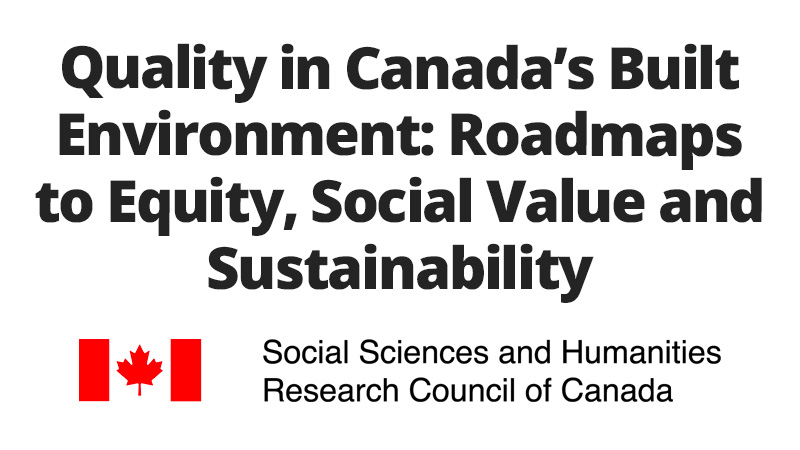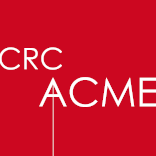
The CRC-ACME coordinates a major research partnership funded by the SSHRC
The CRC-ACME announces its involvement in the partnership Quality of the Built Environment in Canada: Roadmaps to Equity, Social Value and Sustainability. Funded by SSHRC until 2027, this partnership brings together 14 universities, 70 researchers and 68 public and private organizations.
Funded by the Social Sciences and Humanities Research Council of Canada until 2027, a major research partnership on quality in the built environment brings together – for the first time – 14 universities, 70 researchers and 68 public and private organizations at the municipal, provincial and national levels.
The total value of this partnership will be $8.6M ($2.5M from SSHRC, $6.1M from partners including $4.2M in-kind contributions). Such an investment confirms the commitment of all partners and the importance of the collaborative process.
The partnership will stimulate a vital dialog demonstrating how those active in considering and creating the built environment across Canada can contribute to a redefinition of quality that moves us to heightened equity, more social value and greater sustainability at a critical moment for our societies and for our planet.
Coordinated, from the University of Montreal, by the Canada Research Chair in Architecture, Competitions and Mediations of Excellence (CRC-ACME), the partnership Quality in Canada’s Built Environment: Roadmaps to Equity, Social Value and Sustainability addresses the diversity of public environments impacting the everyday life of millions of Canadians in urban spaces, buildings and landscapes.
The program has three aims:
- Analyzing the current limitations of environmental norms and sustainability models to bring us closer to the United NationsSustainable Development Goals (SDGs).
- Co-designing new paths to equity, diversity and inclusion in the built environment.
- Defining new frameworks for the definition of quality so as to enhance the social value of the built environment through roadmaps to quality.
To achieve these objectives, the partnership brings together methodologically 4 sets of stakeholders concerned with the use, scientific study, planning, design, construction and management of built environments:
- Citizens (representatives of communities including minorities and underrepresented populations).
- Cities (national, provincial and municipal actors in the public procurement of built environments).
- Organizations assessing quality (professional associations, award granting institutions, councils, cities).
- Universities (interdisciplinary research teams).
For the first time and at an unprecedented scale in the design disciplines in Canada, the project gathers 14 universities including all of the schools of architecture as well as most landscape architecture and environmental design departments. It mobilizes 23 disciplines concerned with the impact of built environments on citizens. Sixty-eight partner organizations including national institutions and not-for-profit will join in a conversation pertaining to 4 thematic clusters to address urgent considerations on quality relative to:
- Spatial justice and heightened quality of life.
- Integrated resilience, material culture and adaptative reuse.
- inclusive design for health, wellness, aging and special needs.
- processes and policies supporting the reinvention of built environments.
This extraordinary collaborative effort will stimulate training, internships and connections between hundreds of students and communities of practice. The partnership will engage in cross-sectoral co-creation of knowledge whose outcomes will take the form of “roadmaps to quality” (guidebooks, analyses of exemplary case studies, resources for design thinking and proposals for public policies, etc.). These will constitute a bilingual Living Atlas on Quality in the Built Environment set on a digital platform created with the support of the Canada Foundation for Innovation. Designed as a public forum on the social, economic and environmental value of quality, the Living Atlas will offer open access to repertories of award-winning projects, case studies, comparative analyses, scientific resources and articles, interpretative didactic podcasts, analogical maps and visualizations.
SSHRC Partnership Grant # 895-2022-1003
To see the full list of official co-applicants, collaborators, and partners:
Link to the SSHRC platform:
https://www.sshrc-crsh.gc.ca/results-resultats/recipients-recipiendaires/2021/pg-sp-eng.aspx
Steering Committee (2022-2023)
Josie C. Auger, PhD, Adjunct professor, Athabasca University
Jean-Pierre Chupin, PhD, Professor, Université de Montréal, SSHRC partnership director
Carmela Cucuzzella, PhD, Professor, Concordia University
Doramy Ehling, CEO, Rick Hansen Foundation
Terrance Galvin, PhD, Professor, Laurentian University
Thierry Montpetit, OAQ OAA, Public Services and Procurement Canada
Lyne Parent, Directrice, Association des architectes en pratique privée du Québec
Brian Robert Sinclair, PhD, Professor, University of Calgary
Federica Goffi, PhD, Professor, Carleton University
Robert M. Wright, MLA, Professor, University of Toronto
